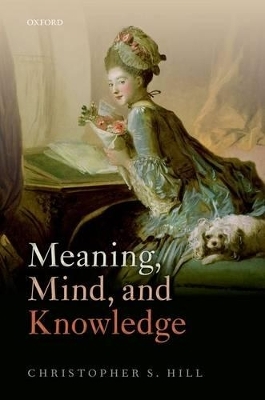
Meaning, Mind, and Knowledge
Seiten
2014
Oxford University Press (Verlag)
978-0-19-966582-2 (ISBN)
Oxford University Press (Verlag)
978-0-19-966582-2 (ISBN)
This volume presents a selection of essays by the leading philosopher Christopher S. Hill. Together, they address central philosophical issues related to four key concerns: the nature of truth; the relation between experiences and brain states; the relation between experiences and representational states; and problems concerning knowledge.
In this collection of essays, most of which are of recent vintage, and seven of which appear here for the first time, Christopher S. Hill addresses a large assortment of philosophical issues. Part I presents a deflationary theory of truth, argues that semantic properties like reference and correspondence with fact can also be characterized in deflationary terms, and offers an account of the value of these 'thin' properties, tracing it to their ability to track more substantial properties that are informational or epistemic in character. Part II defends the view that conscious experiences are type-identical with brain states. It addresses a large array of objections to this identity thesis, including objections based on the alleged multiple realizability of experiences, and objections based on Cartesian intuitions about the modeal separability of mind and matter. In the end, however, it maintains that theories of experience based on type-identity should give way to representationalist accounts. Part III presents a representationalist solution to the mind-body problem. It argues that all awareness, including awareness of qualia, is governed by a Kantian appearance/reality distinction--a distinction between the ways objects and properties are represented as being, and the ways they are in themselves. It also presents theories of pain and visual qualia that kick them out of the mind and assign them to locations in body and the external world. Part IV defends reliabilist theories of epistemic justification, deploys such theories in answering Cartesian skepticism, responds critically to Hawthorne's lottery problem and related proposals about the role of knowledge in conversation and practical reasoning, presents a new account of the sources of modeal knowledge, and proposes an account of logical and mathematical beliefs that represents them as immunune to empirical revision.
In this collection of essays, most of which are of recent vintage, and seven of which appear here for the first time, Christopher S. Hill addresses a large assortment of philosophical issues. Part I presents a deflationary theory of truth, argues that semantic properties like reference and correspondence with fact can also be characterized in deflationary terms, and offers an account of the value of these 'thin' properties, tracing it to their ability to track more substantial properties that are informational or epistemic in character. Part II defends the view that conscious experiences are type-identical with brain states. It addresses a large array of objections to this identity thesis, including objections based on the alleged multiple realizability of experiences, and objections based on Cartesian intuitions about the modeal separability of mind and matter. In the end, however, it maintains that theories of experience based on type-identity should give way to representationalist accounts. Part III presents a representationalist solution to the mind-body problem. It argues that all awareness, including awareness of qualia, is governed by a Kantian appearance/reality distinction--a distinction between the ways objects and properties are represented as being, and the ways they are in themselves. It also presents theories of pain and visual qualia that kick them out of the mind and assign them to locations in body and the external world. Part IV defends reliabilist theories of epistemic justification, deploys such theories in answering Cartesian skepticism, responds critically to Hawthorne's lottery problem and related proposals about the role of knowledge in conversation and practical reasoning, presents a new account of the sources of modeal knowledge, and proposes an account of logical and mathematical beliefs that represents them as immunune to empirical revision.
Christopher S. Hill has taught at a number of institutions, including the University of Arkansas, the University of Michigan, Massachusetts Institute of Technology, and the University of Pittsburgh. He is presently Professor of Philosophy at Brown University. He has published three previous books, and was the editor of Philosophical Topics for twenty years.
PART I: MEANING; PART II: A TYPE MATERIALIST THEORY OF EXPERIENCE; PART III: A REPRESENTATIONALIST THEORY OF EXPERIENCE; PART IV: KNOWLEDGE
| Erscheint lt. Verlag | 6.3.2014 |
|---|---|
| Verlagsort | Oxford |
| Sprache | englisch |
| Maße | 162 x 240 mm |
| Gewicht | 674 g |
| Themenwelt | Geisteswissenschaften ► Philosophie ► Erkenntnistheorie / Wissenschaftstheorie |
| Geisteswissenschaften ► Philosophie ► Metaphysik / Ontologie | |
| Geisteswissenschaften ► Philosophie ► Sprachphilosophie | |
| ISBN-10 | 0-19-966582-6 / 0199665826 |
| ISBN-13 | 978-0-19-966582-2 / 9780199665822 |
| Zustand | Neuware |
| Haben Sie eine Frage zum Produkt? |
Mehr entdecken
aus dem Bereich
aus dem Bereich
die Grundlegung der modernen Philosophie
Buch | Softcover (2023)
C.H.Beck (Verlag)
18,00 €
Buch | Softcover (2023)
Reclam, Philipp (Verlag)
7,00 €

![Was heißt Denken?. Vorlesung Wintersemester 1951/52. [Was bedeutet das alles?] - Martin Heidegger](/media/113619842)
